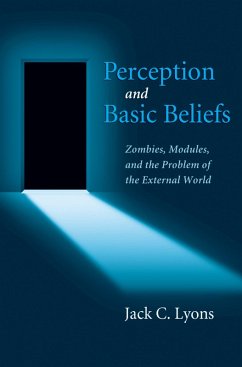Jack Lyons
Perception and Basic Beliefs (eBook, ePUB)
Zombies, Modules, and the Problem of the External World
17,95 €
17,95 €
inkl. MwSt.
Sofort per Download lieferbar

9 °P sammeln
17,95 €
Als Download kaufen

17,95 €
inkl. MwSt.
Sofort per Download lieferbar

9 °P sammeln
Jetzt verschenken
Alle Infos zum eBook verschenken
17,95 €
inkl. MwSt.
Sofort per Download lieferbar
Alle Infos zum eBook verschenken

9 °P sammeln
Jack Lyons
Perception and Basic Beliefs (eBook, ePUB)
Zombies, Modules, and the Problem of the External World
- Format: ePub
- Merkliste
- Auf die Merkliste
- Bewerten Bewerten
- Teilen
- Produkt teilen
- Produkterinnerung
- Produkterinnerung

Bitte loggen Sie sich zunächst in Ihr Kundenkonto ein oder registrieren Sie sich bei
bücher.de, um das eBook-Abo tolino select nutzen zu können.
Hier können Sie sich einloggen
Hier können Sie sich einloggen
Sie sind bereits eingeloggt. Klicken Sie auf 2. tolino select Abo, um fortzufahren.

Bitte loggen Sie sich zunächst in Ihr Kundenkonto ein oder registrieren Sie sich bei bücher.de, um das eBook-Abo tolino select nutzen zu können.
Jack Lyons addresses two central questions in epistemology: which beliefs are epistemologically basic (i.e., noninferentially justified) and where does perception end and inferential cognition begin.
- Geräte: eReader
- mit Kopierschutz
- eBook Hilfe
- Größe: 0.76MB
Andere Kunden interessierten sich auch für
![The Epistemic Innocence of Irrational Beliefs (eBook, ePUB) The Epistemic Innocence of Irrational Beliefs (eBook, ePUB)]() Lisa BortolottiThe Epistemic Innocence of Irrational Beliefs (eBook, ePUB)32,95 €
Lisa BortolottiThe Epistemic Innocence of Irrational Beliefs (eBook, ePUB)32,95 €![Grand Theories and Everyday Beliefs (eBook, ePUB) Grand Theories and Everyday Beliefs (eBook, ePUB)]() Wallace MatsonGrand Theories and Everyday Beliefs (eBook, ePUB)13,95 €
Wallace MatsonGrand Theories and Everyday Beliefs (eBook, ePUB)13,95 €![Bad Beliefs (eBook, ePUB) Bad Beliefs (eBook, ePUB)]() Neil LevyBad Beliefs (eBook, ePUB)41,95 €
Neil LevyBad Beliefs (eBook, ePUB)41,95 €![Basic Structures of Reality (eBook, ePUB) Basic Structures of Reality (eBook, ePUB)]() Colin McginnBasic Structures of Reality (eBook, ePUB)28,95 €
Colin McginnBasic Structures of Reality (eBook, ePUB)28,95 €![Delusions and Beliefs (eBook, ePUB) Delusions and Beliefs (eBook, ePUB)]() Kengo MiyazonoDelusions and Beliefs (eBook, ePUB)23,95 €
Kengo MiyazonoDelusions and Beliefs (eBook, ePUB)23,95 €![Facts, Words and Beliefs (eBook, ePUB) Facts, Words and Beliefs (eBook, ePUB)]() Timothy L. S. SpriggeFacts, Words and Beliefs (eBook, ePUB)33,95 €
Timothy L. S. SpriggeFacts, Words and Beliefs (eBook, ePUB)33,95 €![On Gaslighting (eBook, PDF) On Gaslighting (eBook, PDF)]() Kate AbramsonOn Gaslighting (eBook, PDF)18,95 €
Kate AbramsonOn Gaslighting (eBook, PDF)18,95 €-
-
-
Jack Lyons addresses two central questions in epistemology: which beliefs are epistemologically basic (i.e., noninferentially justified) and where does perception end and inferential cognition begin.
Dieser Download kann aus rechtlichen Gründen nur mit Rechnungsadresse in A, B, BG, CY, CZ, D, DK, EW, E, FIN, F, GR, HR, H, IRL, I, LT, L, LR, M, NL, PL, P, R, S, SLO, SK ausgeliefert werden.
Produktdetails
- Produktdetails
- Verlag: OUP eBook
- Erscheinungstermin: 20. Januar 2009
- Englisch
- ISBN-13: 9780190451868
- Artikelnr.: 42727151
- Verlag: OUP eBook
- Erscheinungstermin: 20. Januar 2009
- Englisch
- ISBN-13: 9780190451868
- Artikelnr.: 42727151
- Herstellerkennzeichnung Die Herstellerinformationen sind derzeit nicht verfügbar.
Jack Lyons is Associate Professor Philosophy, University of Arkansas
Abbreviations
Chapter 1: External Object Foundationalism
1.1The Problem of the External World
1.2 Metaphysical and Epistemological Direct Realisms
1.3 Basic Beliefs
Chapter 2: Doxastic and Nondoxastic Theories
2.1 Evidential and Nonevidential Justifiers
2.2 The Supervenience Argument
2.3 Doxasticism and Nondoxasticism
2.4 Doxastic Theories
Chapter 3: Experientialist Theories: 3.1 Sensation and Perception
3.2 Sensations as Grounds
3.2.1 Sensationless Perception
3.2.2 The Sensation/perception Gap and Collateral Information
3.2.3 Problems Concerning Basing
3.2.4 SE and the Content of Sensations
3.3 Percepts as Grounds
3.3.1 In Search of the Percept
3.3.2 Percepts and Beliefs
3.3.3 The Zombies Return
3.4 The Belief Principle
3.5 Experiential States as Nonevidential Justifiers
3.6 Intuitive Resistance
3.7 Recapitulation
Chapter 4: Perceptual Systems and Perceptual Beliefs
4.1 Perceptual Systems
4.1.1 Cognitive Systems/Modules
4.1.2 Perceptual Modules
4.2 The Plausibility of the Perceptual System Theory
4.2.1 The "Grain Size" of Perceptual Beliefs
4.2.2 Perception and Ungrounded Justified Belief
4.2.3 Perceptual Learning and Nonexperiential 'Looks'
4.2.4 Percept Experientialism Revisited
4.3 Perceptual Beliefs and Basic Beliefs
Chapter 5: Perception, Clairvoyance, and Reliability
5.1 Simple Reliabilism and the Norman/Truetemp Objections
5.2 Clairvoyance and Basicality
5.2.1 Underspecification and the "Clairvoyance Challenge"
5.2.2 Perception and Other Cognitive Abilities
5.2.3 "Meta-Incoherence"
5.3 Reliability and Basicality
5.3.1Clairvoyance and Defeat
5.3.2 Experientialist Reliabilism
5.3.3 Early Reliabilism
5.3.4 Teleological Reliabilism
Chapter 6: Basic Beliefs
6.1 The Delineation Problem
6.1.1 The Desiderata
6.1.2 A Systems Theory of Basicality
6.1.3 Counterexamples and Replies
6.2 Intuitions and Beyond
6.2.1 Descriptive and Normative Epistemology
6.2.2 Cognitive Science and Basicality
6.2.3 Illustration: Why My Philosophy is More God-Friendly than Plantinga's
6.2.4 Reflective Equilibrium and Etiological Constraints
Chapter 7: Basic and Nonbasic Beliefs in a Reliabilist Epistemology
7.1Toward a Theory of Justification
7.1.1 Evidential Justification
7.1.2 Defeat
7.1.3 Outline of a Theory
7.2 Internalism and Externalism
7.3 The Problem(s) of the External World
References
Index
Chapter 1: External Object Foundationalism
1.1The Problem of the External World
1.2 Metaphysical and Epistemological Direct Realisms
1.3 Basic Beliefs
Chapter 2: Doxastic and Nondoxastic Theories
2.1 Evidential and Nonevidential Justifiers
2.2 The Supervenience Argument
2.3 Doxasticism and Nondoxasticism
2.4 Doxastic Theories
Chapter 3: Experientialist Theories: 3.1 Sensation and Perception
3.2 Sensations as Grounds
3.2.1 Sensationless Perception
3.2.2 The Sensation/perception Gap and Collateral Information
3.2.3 Problems Concerning Basing
3.2.4 SE and the Content of Sensations
3.3 Percepts as Grounds
3.3.1 In Search of the Percept
3.3.2 Percepts and Beliefs
3.3.3 The Zombies Return
3.4 The Belief Principle
3.5 Experiential States as Nonevidential Justifiers
3.6 Intuitive Resistance
3.7 Recapitulation
Chapter 4: Perceptual Systems and Perceptual Beliefs
4.1 Perceptual Systems
4.1.1 Cognitive Systems/Modules
4.1.2 Perceptual Modules
4.2 The Plausibility of the Perceptual System Theory
4.2.1 The "Grain Size" of Perceptual Beliefs
4.2.2 Perception and Ungrounded Justified Belief
4.2.3 Perceptual Learning and Nonexperiential 'Looks'
4.2.4 Percept Experientialism Revisited
4.3 Perceptual Beliefs and Basic Beliefs
Chapter 5: Perception, Clairvoyance, and Reliability
5.1 Simple Reliabilism and the Norman/Truetemp Objections
5.2 Clairvoyance and Basicality
5.2.1 Underspecification and the "Clairvoyance Challenge"
5.2.2 Perception and Other Cognitive Abilities
5.2.3 "Meta-Incoherence"
5.3 Reliability and Basicality
5.3.1Clairvoyance and Defeat
5.3.2 Experientialist Reliabilism
5.3.3 Early Reliabilism
5.3.4 Teleological Reliabilism
Chapter 6: Basic Beliefs
6.1 The Delineation Problem
6.1.1 The Desiderata
6.1.2 A Systems Theory of Basicality
6.1.3 Counterexamples and Replies
6.2 Intuitions and Beyond
6.2.1 Descriptive and Normative Epistemology
6.2.2 Cognitive Science and Basicality
6.2.3 Illustration: Why My Philosophy is More God-Friendly than Plantinga's
6.2.4 Reflective Equilibrium and Etiological Constraints
Chapter 7: Basic and Nonbasic Beliefs in a Reliabilist Epistemology
7.1Toward a Theory of Justification
7.1.1 Evidential Justification
7.1.2 Defeat
7.1.3 Outline of a Theory
7.2 Internalism and Externalism
7.3 The Problem(s) of the External World
References
Index
Abbreviations
Chapter 1: External Object Foundationalism
1.1The Problem of the External World
1.2 Metaphysical and Epistemological Direct Realisms
1.3 Basic Beliefs
Chapter 2: Doxastic and Nondoxastic Theories
2.1 Evidential and Nonevidential Justifiers
2.2 The Supervenience Argument
2.3 Doxasticism and Nondoxasticism
2.4 Doxastic Theories
Chapter 3: Experientialist Theories: 3.1 Sensation and Perception
3.2 Sensations as Grounds
3.2.1 Sensationless Perception
3.2.2 The Sensation/perception Gap and Collateral Information
3.2.3 Problems Concerning Basing
3.2.4 SE and the Content of Sensations
3.3 Percepts as Grounds
3.3.1 In Search of the Percept
3.3.2 Percepts and Beliefs
3.3.3 The Zombies Return
3.4 The Belief Principle
3.5 Experiential States as Nonevidential Justifiers
3.6 Intuitive Resistance
3.7 Recapitulation
Chapter 4: Perceptual Systems and Perceptual Beliefs
4.1 Perceptual Systems
4.1.1 Cognitive Systems/Modules
4.1.2 Perceptual Modules
4.2 The Plausibility of the Perceptual System Theory
4.2.1 The "Grain Size" of Perceptual Beliefs
4.2.2 Perception and Ungrounded Justified Belief
4.2.3 Perceptual Learning and Nonexperiential 'Looks'
4.2.4 Percept Experientialism Revisited
4.3 Perceptual Beliefs and Basic Beliefs
Chapter 5: Perception, Clairvoyance, and Reliability
5.1 Simple Reliabilism and the Norman/Truetemp Objections
5.2 Clairvoyance and Basicality
5.2.1 Underspecification and the "Clairvoyance Challenge"
5.2.2 Perception and Other Cognitive Abilities
5.2.3 "Meta-Incoherence"
5.3 Reliability and Basicality
5.3.1Clairvoyance and Defeat
5.3.2 Experientialist Reliabilism
5.3.3 Early Reliabilism
5.3.4 Teleological Reliabilism
Chapter 6: Basic Beliefs
6.1 The Delineation Problem
6.1.1 The Desiderata
6.1.2 A Systems Theory of Basicality
6.1.3 Counterexamples and Replies
6.2 Intuitions and Beyond
6.2.1 Descriptive and Normative Epistemology
6.2.2 Cognitive Science and Basicality
6.2.3 Illustration: Why My Philosophy is More God-Friendly than Plantinga's
6.2.4 Reflective Equilibrium and Etiological Constraints
Chapter 7: Basic and Nonbasic Beliefs in a Reliabilist Epistemology
7.1Toward a Theory of Justification
7.1.1 Evidential Justification
7.1.2 Defeat
7.1.3 Outline of a Theory
7.2 Internalism and Externalism
7.3 The Problem(s) of the External World
References
Index
Chapter 1: External Object Foundationalism
1.1The Problem of the External World
1.2 Metaphysical and Epistemological Direct Realisms
1.3 Basic Beliefs
Chapter 2: Doxastic and Nondoxastic Theories
2.1 Evidential and Nonevidential Justifiers
2.2 The Supervenience Argument
2.3 Doxasticism and Nondoxasticism
2.4 Doxastic Theories
Chapter 3: Experientialist Theories: 3.1 Sensation and Perception
3.2 Sensations as Grounds
3.2.1 Sensationless Perception
3.2.2 The Sensation/perception Gap and Collateral Information
3.2.3 Problems Concerning Basing
3.2.4 SE and the Content of Sensations
3.3 Percepts as Grounds
3.3.1 In Search of the Percept
3.3.2 Percepts and Beliefs
3.3.3 The Zombies Return
3.4 The Belief Principle
3.5 Experiential States as Nonevidential Justifiers
3.6 Intuitive Resistance
3.7 Recapitulation
Chapter 4: Perceptual Systems and Perceptual Beliefs
4.1 Perceptual Systems
4.1.1 Cognitive Systems/Modules
4.1.2 Perceptual Modules
4.2 The Plausibility of the Perceptual System Theory
4.2.1 The "Grain Size" of Perceptual Beliefs
4.2.2 Perception and Ungrounded Justified Belief
4.2.3 Perceptual Learning and Nonexperiential 'Looks'
4.2.4 Percept Experientialism Revisited
4.3 Perceptual Beliefs and Basic Beliefs
Chapter 5: Perception, Clairvoyance, and Reliability
5.1 Simple Reliabilism and the Norman/Truetemp Objections
5.2 Clairvoyance and Basicality
5.2.1 Underspecification and the "Clairvoyance Challenge"
5.2.2 Perception and Other Cognitive Abilities
5.2.3 "Meta-Incoherence"
5.3 Reliability and Basicality
5.3.1Clairvoyance and Defeat
5.3.2 Experientialist Reliabilism
5.3.3 Early Reliabilism
5.3.4 Teleological Reliabilism
Chapter 6: Basic Beliefs
6.1 The Delineation Problem
6.1.1 The Desiderata
6.1.2 A Systems Theory of Basicality
6.1.3 Counterexamples and Replies
6.2 Intuitions and Beyond
6.2.1 Descriptive and Normative Epistemology
6.2.2 Cognitive Science and Basicality
6.2.3 Illustration: Why My Philosophy is More God-Friendly than Plantinga's
6.2.4 Reflective Equilibrium and Etiological Constraints
Chapter 7: Basic and Nonbasic Beliefs in a Reliabilist Epistemology
7.1Toward a Theory of Justification
7.1.1 Evidential Justification
7.1.2 Defeat
7.1.3 Outline of a Theory
7.2 Internalism and Externalism
7.3 The Problem(s) of the External World
References
Index







